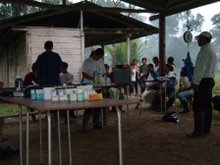I met Severiano O. at the Downtown Drop-in Center on Skid Row during L.A.’s Big Sunday 2007 event. He’s 26 years old, tan, tired and unkempt—they offer showers at the Drop-in Center, but from his appearance, that doesn’t seem to be a priority for him right now.
He is quick to tell me that the reason he is currently homeless is because of a restraining order placed against him by his girlfriend, with whom he was sharing an apartment in downtown L.A.
Growing up in the town of Colima near Guadalajara, Mexico, Severiano had four brothers and four sisters. It was a big brood, and when asked about family dynamics, he doesn’t hesitate to tell me that his family life was unproblematic.
“We didn’t have too many issues. My parents are still together,” he says.
Like so many Mexicans, Severiano came to the U.S. for job opportunities, and has had no trouble finding work in his chosen profession—construction. His friend, also in the construction business, helped pay his way from Mexico and even gave him a place to live and found him his first job. Severiano likes construction work; his only complaint is that employers are often unwilling to pay his going rate of $250 per day.
He tells me that has worked in various cities in Southern California, and even traveled to the city of Pasco in Washington state to build houses. However, in Pasco, the construction job fell through and he ended up working in the field, picking apples. When winter came, there was no more work, so in 2001 he came back to L.A.
After a one-month stint at an L.A. construction company, Severiano began “esquiñando,” literally, “cornering,” an activity many Californians are particularly familiar with. He would sit on the corner of a Home Depot, waiting for people to pick him up for a day’s work. Once, he found a “patron” who gave him steady work for eight months. He doesn’t mention why the job ended; he just tells me he went back to sitting on the corner.
I ask him if he has ever had trouble finding work. “No, I can find work easily. I can make an entire house from start to finish. They don’t want to pay $250, they’d rather pay $80 or $150.” Has he ever had a problem with wage arrears? “Sometimes they don’t want to pay what they promised,” he concedes. “They’re not happy with my work, or they just want to pay less.”
Like many homeless young men living on Skid Row, Severiano has both a drug problem and a police record. He was deported twice in 2006, after being incarcerated on separate occasions for domestic violence and driving under the influence. He was dumped at the border town of Tijuana only to return soon afterward.
“It’s very hard not to fall into drugs here,” he says, alluding to the rampant dealing of drugs that mark Skid Row’s decrepit atmosphere. Is he clean now? “Now, yes.”
Unlike many other immigrants, however, Severiano has family members in the area. As close as San Pedro, his cousin has a home, a job, and a growing family. A brother lives in Las Vegas, and a sister lives nearby in Los Angeles. Why doesn’t he stay there while he gets back on his feet? “I feel like a burden when I’m there. I want to make it on my own. What I get in my life, I want to earn with my own two hands.”
On the other hand, Severiano notices fundamental cultural differences in the way Mexicans and Americans live. “I’m not used to living alone. I’ve never been alone,” he tells me. Unconcerned with his familial relationships, Severiano just wants to make things right with his girlfriend. “I’ve let her down many times. But everything happens in its own time. With tranquility, calmness.”
And finally, I ask about the issue of documentation. How does Severiano feel about the politics surrounding migrant labor? His answer is apolitical—rather, it is simple, humane and reflective. “Leave that topic alone. There are many people who are good and honest, yet they don’t have their papers. There’s a lot of racism.”
“This country is ours too,” he declares. “Our own government is very corrupt. All are. There are mafia, trafficking of drugs, and many things.”
But the challenges for an illegal immigrant like Severiano are profound. “You can’t even say anything, or protect yourself,” he says. “You have no voice. You are boxed in. Some people rob, and do other things. I don’t.”
Above all, Severiano believes in humanity, self-improvement and fate. “All of us have problems. That guy has his, and I have mine. It’s just that I have some unruliness in me. I want to get rid of that. One has to resign oneself to life’s losses and gains. You don’t know your destiny.”
~As told to Farah K.
Subscribe to:
Post Comments (Atom)





No comments:
Post a Comment